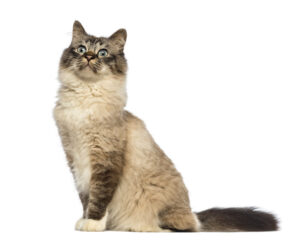
Megacolon is manageable with veterinary intervention, so watch for warning signs and have your cat seen by their vet regularly.
Megacolon refers to inflammation and distention of the large intestine that leads to constipation and then obstipation. Obstipation is a term used for constipation that’s so severe it requires manual removal of feces from the colon. Megacolon occurs most frequently in middle to advanced aged cats and will require veterinary intervention to keep your cat comfortable and healthy. Conservative (medical) management is typically the first line of treatment. Unfortunately, even with careful management, megacolon will worsen over time until surgery is eventually needed.
Diet and Medicine
In the early stages of megacolon, it can be managed through diet and medications. A cat with megacolon will be put on a low-residue diet, which just means that your cat will be put on a diet of food that is easily digested. Your veterinarian will recommend prescription diet choices that meet your cat’s needs. In addition, your cat may be put on medications known as lactulose and cisapride. Lactulose sends matter through the gut more quickly, while cisapride stimulates movement of the colon. These methods won’t work forever, so regular check-ups with your veterinarian are important to keep tabs on your cat’s condition. As it worsens or stops responding to medical management, the next step is surgical intervention.
Surgery
Once diet and medication are no longer effective, the next step is a surgery known as a subtotal colectomy. With this surgery, the affected portion of the colon and some surrounding tissue is removed and the remaining healthy bowel sections are sewn together. While the surgery is difficult, the majority of cats respond well to it and make a near-full to full recovery. Post-operation cats may experience some diarrhea post-surgery, but this will correct itself in time and eventually be close to normal. After some time to heal, the majority of cats who undergo a subtotal colectomy will lead normal, healthy lives.
Trust Maryland Veterinary Surgical Services With Your Companion’s Health
Your companion’s health is important, and the team at MVSS is ready to provide the best care possible for your furry family. We are dedicated to combining comprehensive exams and assessments with informative and honest discussions of your companion’s care. Once we have worked with you to decide on the best course of action for your dog, our professionals will use their surgical expertise to work towards the goal of giving your companion an active and pain-free life. We are proud to serve loyal companions in Catonsville and Baltimore. To learn more about our services, give us a call at 410-788-4088 or visit us online. For more information and tips for pet health, follow us on Facebook and Pinterest.
